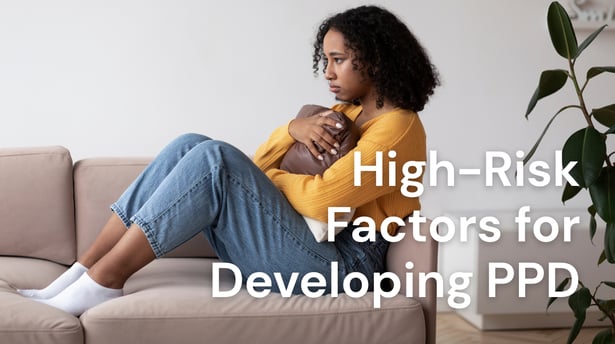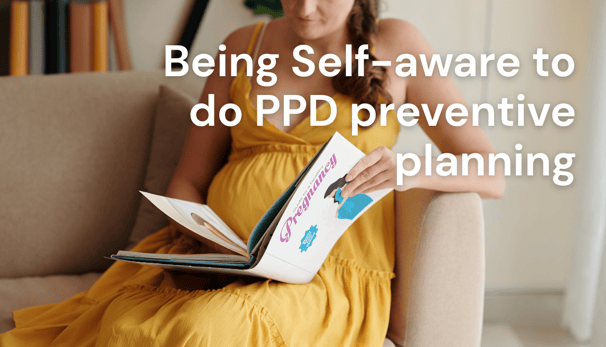Understanding High-Risk Factors for Developing Postpartum Depression
6/28/20254 min read
Postpartum depression (PPD) doesn’t strike out of nowhere. While it can affect anyone—regardless of background, income, or parenting experience—there are certain conditions that increase the likelihood of developing PPD. These risk factors don’t guarantee someone will experience depression after childbirth, but they do highlight the importance of early awareness, support, and preventive care.
At Peace Temple, we believe that education is the first line of defence against postpartum mental health challenges. Recognizing the risk factors doesn’t just help clinicians—it empowers parents and families to be more proactive and compassionate when emotional struggles arise.


Why Identifying Risk Factors Matters
Catching postpartum depression early—or even preventing it—begins with understanding who is most vulnerable. Many new mothers and fathers blame themselves for feeling low or overwhelmed, when in reality, their emotional state may be influenced by a complex web of biological, psychological, and environmental factors.
By identifying high-risk individuals, we can offer support before symptoms escalate, improving long-term outcomes for both parent and child.
1. History of Mental Health Disorders
One of the strongest predictors of PPD is a personal or family history of depression, anxiety, or bipolar disorder. If someone has struggled with mental health challenges in the past—especially during pregnancy or postpartum in a previous birth—the chances of experiencing PPD increase significantly.
Even subclinical mood issues, like chronic stress or persistent low mood, can elevate risk.
At Peace Temple, we offer preventive counselling for expectant parents with such histories, helping them build emotional resilience before their baby arrives.
2. Lack of Emotional or Social Support
No parent was meant to do this alone. The absence of a reliable support system—partners, family, friends, or community—can dramatically raise the risk of postpartum depression. Social isolation, emotional neglect, or strained relationships all contribute to a sense of being overwhelmed or abandoned.
This factor is especially relevant in modern life, where new parents often live far from extended family and feel pressure to "do it all" without asking for help.
Our support groups at Peace Temple offer connection, validation, and practical tools for those feeling alone or unsupported in their parenting journey.
3. Unplanned or High-Stress Pregnancy
A pregnancy that was unplanned, unwanted, or filled with uncertainty can significantly raise the risk of postpartum mood disorders. Emotional distress during pregnancy—whether due to financial stress, relationship conflict, or medical complications—can lay the groundwork for depression after birth.
Similarly, pregnancies involving high-risk diagnoses, hospitalization, or fears for the baby’s health can leave parents emotionally exhausted and anxious.
That’s why Peace Temple’s prenatal counselling includes space to process complicated feelings, even those that feel “taboo” like ambivalence or resentment.
4. Traumatic Childbirth Experience
Birth trauma—ranging from emergency C-sections and excessive pain to feeling ignored or unsafe in medical care—can leave emotional scars that influence postpartum well-being. Feelings of fear, helplessness, or loss of control during labor can evolve into depression or post-traumatic stress in the weeks that follow.
Some women may avoid bonding with their baby or replay the birth experience obsessively in their minds. Others feel like their trauma is minimized because they “had a healthy baby.”
At Peace Temple, we validate these experiences and offer trauma-informed therapy to help mothers reclaim their narratives and heal emotionally.
5. Hormonal Sensitivity
Some women are especially sensitive to hormonal changes—which is why they may experience mood symptoms related to menstruation, birth control, or pregnancy. These women are at a higher biological risk for developing postpartum depression when estrogen and progesterone levels drop sharply after childbirth.
Hormonal sensitivity doesn’t imply weakness—it’s simply how some bodies respond. Recognizing this sensitivity allows us to tailor treatments accordingly, often combining therapy with integrative support such as nutritional guidance, gentle movement, and mindfulness, all of which are available through Peace Temple’s holistic postpartum programs.


6. Infant Health Complications
Caring for a baby with medical needs—whether premature, ill, or in the NICU—can leave parents emotionally and physically drained. The fear, guilt, and hypervigilance that come with these experiences are fertile ground for anxiety and depression.
Even after discharge, parents may remain on edge, hyper-alert to every cough or cry, struggling to relax or enjoy bonding. The prolonged stress response can evolve into postpartum depression if not addressed.
Peace Temple offers targeted emotional support for NICU parents and caregivers managing high-needs infants.
7. Sleep Deprivation
It may sound basic, but chronic sleep loss plays a major role in the onset and intensity of postpartum depression. Sleep impacts emotional regulation, stress tolerance, and even hormone production.
New parents often normalize exhaustion, but there’s a tipping point where lack of rest becomes a mental health hazard.
At Peace Temple, we help parents create sustainable routines and practice realistic sleep strategies—whether through boundaries, baby sleep coaching, or supportive communication with partners.
8. Financial or Occupational Stress
Economic insecurity can compound the emotional toll of new parenthood. The cost of medical care, unpaid leave, or job instability creates anxiety that bleeds into daily life. Parents facing income loss or work stress are more likely to experience feelings of failure or hopelessness.
This pressure is especially intense for single parents or those navigating systemic barriers to resources.
Our team at Peace Temple recognizes that mental health cannot be separated from real-life circumstances. We work to offer accessible, flexible care for individuals facing logistical and financial challenges.
9. History of Trauma or Abuse
Survivors of emotional, physical, or sexual abuse may find that the vulnerable postpartum period reactivates old wounds. The physical and emotional intensity of pregnancy, birth, and early parenting can stir up buried trauma, leaving individuals emotionally dysregulated or dissociated.
In such cases, postpartum depression may blend with symptoms of PTSD, requiring gentle, specialized care.
Peace Temple’s trauma-informed therapists are trained to support individuals processing trauma in a compassionate, non-triggering way.
Final Thoughts: Risk Isn’t Destiny
Having one or more risk factors does not mean you’re destined to experience postpartum depression. But it does mean you may benefit from extra support, self-awareness, and preventive planning.
At Peace Temple, we see the power of early intervention every day. When parents are informed and prepared, they feel less overwhelmed and more equipped to care for both themselves and their babies.
Whether you’re expecting, newly postpartum, or years into parenting—mental health deserves attention. Risk factors may raise the odds, but your response can redefine the outcome.
